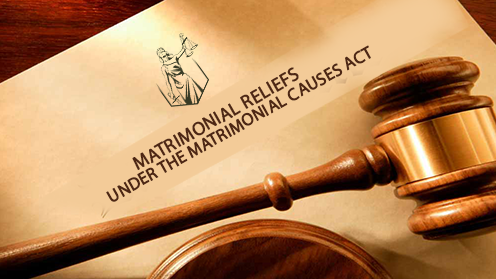Shocking Truth About Matrimonial Reliefs in Nigeria: A Legal Overview
Culturally, marriage is a union of either a man with one or many women, or a union of a woman with a man or many men.
In the legal context, it is a union of a man and a woman. This is a union ordained by God. Nevertheless, there are many acts and laws that guide the act and conducts of marriages, they include; Marriage Act, 2004, Matrimonial Causes Act, 2004 and Matrimonial Causes Rules of 1983. It is to be noted that these acts and rule apply to a monogamous marriage that is a voluntary union and not a customary or Islamic marriage.
In the general legal term, matrimonial reliefs are the compensations, aids, protections or redress ordered by a court of competent jurisdiction to avert unfair or unjust acts in a voluntary or an involuntary marriage of a man and a woman.
In a nutshell, we will be discussing the some of the most relevant reliefs which are obtainable in a marriage conducted under the Matrimonial Causes Acts and other related Acts and Laws.
1. Dissolution of marriage:
This is the most widely know relief in a marriage. It is ordinarily called “Divorce”. According to the section 15 (1) of Matrimonial Causes Act, 2004, inter alia, the only ground by which a marriage contracted under the Act can be dissolved is that the marriage has broken down irretrievably. In this hand and in the determination of an irretrievably broken down marriage, subsection 2 of section 15 (ibid) states as follows, among other grounds; the respondent must have willfully and persistently refused to consummate the marriage, or, that the respondent had committed adultery, thirdly, that the respondent has deserted the petitioner for at least one year.
It is worthy of note that by section 30(1) of the above Act, the course to dissolve a marriage cannot be instituted in a court wherein the marriage has not lasted for two years unless the leave of court is sought and obtained. And it must be demonstrated that there have been an extreme and exceptional hardship on the part of the petitioner.
2. Nullification of marriage:
A void marriage is void ab initio. The nullification of a marriage is sought in a court when a marriage is either void or voidable. Wherein a marriage is void, any party who is interested in the case can institute an action in court to declare the marriage void, nevertheless, a void marriage remains void even when not institute in court. However, where a marriage is voidable, it is but only the party to the marriage can institute an action in court for the nullification of the marriage. Notwithstanding the above encapsulations, some of the few thing that will make a marriage void or voidable are; that the respondent contracted a customary marriage with another person after a marriage under the Act, that the consent of any other parties was not sought, that either of the parties is not within the marriageable age, that the parties did not contract the marriage under the law of the land.
3. Judicial separation:
This is a judicial order given by the court to parties in a marriage who either do not want to live together nor dissolve their marriage. This is done so that parties can be given a reasonable time to reason whether to continue with the marriage, though the marriage is still valid.
4. Restitution of Conjugal Rights
Restitution of conjugal rights is an order requiring a spouse who has unjustifiably left the marriage to return and fulfill marital obligations. However, this relief is rarely enforced in Nigeria due to its impracticality.
5. Maintenance (Spousal and Child Support)
Maintenance is a financial obligation imposed on a spouse to provide for their partner or children. Under the Matrimonial Causes Act, the court may order:
Spousal maintenance: A husband or wife may be required to provide financial support to the other spouse.
Child maintenance: The non-custodial parent may be required to provide financial assistance for the welfare of the child.
Relevant Case Law
In Odusote v. Odusote (2010) 1 NWLR (Pt. 1203) 336, the court emphasized that maintenance is awarded based on the financial capacity of the party responsible for payment.
6. Custody of Children
Child custody issues arise when couples separate or divorce. The welfare of the child is the paramount consideration in deciding custody matters. The court considers:
The child’s age
The financial and emotional capacity of each parent
The child’s preference (if of sufficient age)
The ability of each parent to provide a stable home environment
Case Law Example
In Williams v. Williams (1987) 2 NWLR (Pt. 54) 66, the Supreme Court held that in custody cases, the best interest of the child is the determining factor.
7. Settlement of Property
Property settlement determines how assets acquired during the marriage are shared between spouses. Courts often consider factors such as:
The financial contribution of each party
The needs of any dependent children
Agreements made before or during the marriage
Challenges Associated with Matrimonial Reliefs in Nigeria
Lengthy and Expensive Legal Process
Cultural and Religious Barriers
Inadequate Legal Awareness
Enforcement of Court Orders
Conclusively, by section 2 (1) of the Matrimonial Causes Act, the only court that has jurisdiction to any of the proceedings above is the High Court of a State. However, where the high court orders for maintenance of a party in the marriage, the court of summary jurisdiction which is the magistrate court can enforce it.
NB: This article is not a legal advice, and under no circumstance should you take it as such. All information provided are for general purpose only. For information, please contact chamanlawfirm@gmail.com
WRITTEN BY: CHAMAN LAW FIRM TEAM
E-MAIL: chamanlawfirm@gmail.com
Tel: 08065553671, 08024230080


